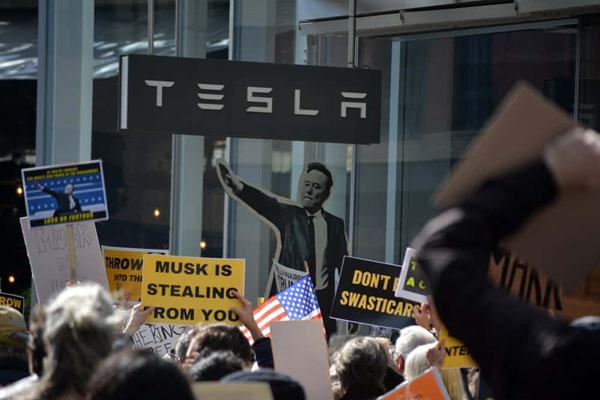 Credit: Finbold
Credit: Finbold
Finbold research has found that Tesla’s (TSLA) sales in Europe totalled just 600 cars per day during the first quarter of 2025; the total number of vehicles sold was 54,020, 37.2% fewer than in the same period in 2024, when it was 86,027*.
The global results also highlighted a downtrend as Elon Musk’s electric vehicle (EV) maker delivered 13% fewer cars in Q1 2025 than in the same quarter one year earlier, with a total of 336,681 compared to 386,810.
Why the Q1 Tesla sales crash was easy to foresee
As dire as the results in Europe (EU + EFTA + UK) have proven, they are hardly unexpected. Throughout the first quarter, multiple reports emerged showing that Tesla sales in various countries in the region have been declining.
The dire state was already evident in March, when February reports showed a significant collapse in multiple countries. At the time, the figures from Germany, France, and across Scandinavia were especially notable, as they showed a plunge greater than 70% in certain areas.
Notably, the United Kingdom was the only major European market where Tesla experienced growth, with a 6% increase in deliveries compared to Q1 2024.
The fall from grace can largely be attributed to Elon Musk’s controversial political activities.
Many potential customers became disgruntled over the billionaire’s endorsement of extreme political options such as Germany’s Alternative für Deutschland (AfD). At the same time, Polish politicians went so far as to call for a national boycott over the businessman’s calls to ‘move past’ Nazi guilt.
Beyond direct hostility toward Musk’s comments and actions, the surge in vandalism targeting Teslas also contributed, as some potential customers estimated it is better to seek a new car elsewhere, or risk having their vehicles totalled by more aggressive activists.
Elsewhere, anxiety over the trade war has also likely contributed to the drop in sales. However, the impact of the tariffs themselves has probably been negligible due to a lack of implementation.
Could Tesla see a resurgence in Q2?
Moving into Q2, there is some hope that Tesla will enjoy a recovery, as the billionaire pledged to reduce his political activities, particularly his role in the Department of Government Efficiency (DOGE), and focus more on running the company. Such a pivot could prove critical, as 2025 appears to be a pivotal year for the EV maker.
Although the development prompted some experts, such as Wedbush’s Dan Ives, to raise their TSLA stock price target, it is doubtful that the effects will be seen in the short or mid-term.
In addition to stepping back from politics, Tesla may need time to rebuild trust and distance itself from recent controversies.
As Andreja Stojanovic, a co-author of the research, pointed out: “The results continue a previous negative trend, which had 2024 be Tesla’s first-ever year of decline due to rising pressure on consumers from the cost-of-living crisis and on the company itself, as competitors have been growing their market share.”
Lastly, although the revelation caused significant optimism about Q2 and the remainder of 2025, it is doubtful that the positive effects will be visible in the short and medium term.
* according to data Finbold retrieved from Tesla and the European Automobile Manufacturers Association (ACEA).








